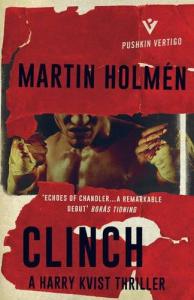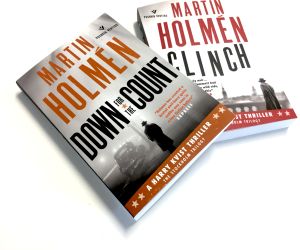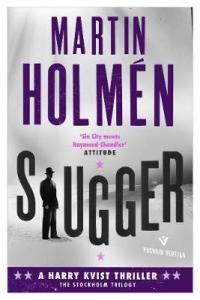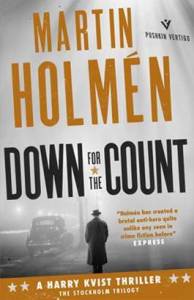Clinch – Martin Holmén
 ‘Clinch’, the debut crime novel by Swedish author Martin Holmén, does exactly what it says on the tin, and does it very well. Right from the outset it grips you in a fierce embrace, and doesn’t let go. It gets personal, goes deep, and isn’t ashamed of its raw edges. It’s also highly original, a Scandinavian crime novel with a difference, though still solidly grounded in some of the modern canon’s classic features.
‘Clinch’, the debut crime novel by Swedish author Martin Holmén, does exactly what it says on the tin, and does it very well. Right from the outset it grips you in a fierce embrace, and doesn’t let go. It gets personal, goes deep, and isn’t ashamed of its raw edges. It’s also highly original, a Scandinavian crime novel with a difference, though still solidly grounded in some of the modern canon’s classic features.
Even more than the period setting, – we’re in early 1930s Stockholm – the novel’s protagonist, Harry Kvist, is a revelation: if you thought that a former sailor and top-notch boxer, now living precariously as a debt-collector for minor businesses and enforcer for disreputable individuals, could not make a brilliant lead character in a novel, you can think again. Kvist is rough, grim and he knows he is. He lives a shabby, solitary existence in a down-and-out neighbourhood, renting a room above an undertaker’s and pinching his pennies, his kronor and öre rather, between one job and the next.
He is also tough, cunning and underneath the brittle veneer he has a strong sense of dignity, if not moral grounding. He doesn’t resent his lot, he’s aware of his own failings, past and present, and has refused the easiest out of all, that of blaming his fellow men and women for his plight. He is not averse to schnapps and the occasional recreational drug, and is cheerfully bi-sexual.
He is also known to the Stockholm police, having done time for assault and petty larceny in the past. So it’s no wonder that the police show up at his lodgings when Zetterberg, a man he has ‘visited’ to collect a debt, issuing a painful warning of what would happen if he didn’t cough up the next day, is found dead inside his torched flat. A witness can place Kvist on the crime scene, and that is enough for the investigators. Another witness though, a young prostitute that goes by various names and is as elusive as a butterfly, can absolve Kvist of the crime.
Because the evidence is only circumstantial, and because someone high up in the police hierarchy may have another agenda, Kvist is released after a couple of nights in the local nick. He immediately sets out to find the prostitute that could clear him, taking the reader on a tour of Stockholm’s working class districts, and below, to some of the most destitute areas within the prosperous Swedish capital. For all the interesting – as in sometimes charming, sometimes distressing – characters Holmén populates the novel with, this is where the plot occasionally wears a little thin, though it’s never hackneyed, not even when Kvist has a fling with Doris Steiner, a dark, sensual society lady.
What makes ‘Clinch’ powerful, absorbing and eminently readable however, even when the pace slows down a touch, is Holmén’s stunning recreation of 1930s Stockholm. It is a city as far as possible from the polished international capital of present-day travel websites, and though I wouldn’t know how realistic the author’s re-telling is, it is undoubtedly another of the novel’s assets. An achievement that is all the more telling of Holmén’s narrative skills since his painstaking, almost quirky attention to historical detail never becomes stodgy, and shies away from both paternalism and sensationalism. And which merits a mention for the novel’s translator, Henning Koch, for getting what is a challenging linguistic register just right, striking a clever balance between period setting and contemporary readability.
Holmén is not averse to some less-than-indirect social critique, which Swedish crime fiction has always been fond of since the genre was defined in the 1960s, in the brilliant inspector Martin Beck novels by Maj Sjöwall and Per Wahlöö. Holmén obviously relishes the contrast between the glitter of an icy cold Stockholm Christmas and the devastating poverty which cowers on its fringes. But Harry Kvist’s candid acceptance of his lot, his refusal to be beaten by it and his resourcefulness amply justify Holmén’s delving in Stockholm’s less attractive features.
There is a clever twist at the end of course, making for a satisfying finale and confirming how Martin Holmén has created a remarkable novel that works well at many levels, ticking all the right boxes for the Scandi crime category while introducing a truly remarkable character from another era, who can punch well above his weight in the contemporary crime fiction landscape.






